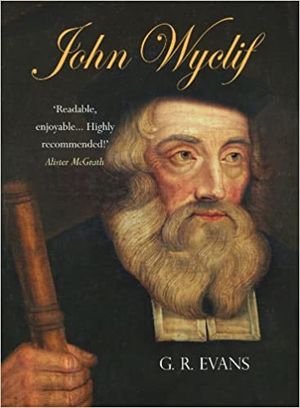‘There is a popular fallacy that biographers fall in love with their subjects. Such a cosy presumption … Writing biography … can just as easily as not, be an act of contempt … Wyclif may not be lovable, but he deserves sympathy and a kind of respect. What kind, and for what, the reader may judge from the following pages’.1So runs the preface of this new biography of John Wyclif (we shall use the author’s spelling). There is certainly no hero worship here but rather an attempt to revise the traditional view and question Wyclif’s contribution to Reformation history.The book is well organised with clearly defined chapters that take us through the leading events of Wyclif’s life. A great amount of time is spent on the academic setting before the ‘real’ story begins.The reason given is that it sets the scene for those unfamiliar with the period and culture – but for the general reader I fear it is too long and too embroiled in the intellectual battles of late medieval academia. For those more familiar with the period it becomes unnecessary padding.As a result, the text becomes rather heavy with a greater focus on Wyclif’s academic life than his spiritual, giving the book a strongly one dimensional perspective. The final years leave us with a grumpy old man, frustrated and bewildered with the troubles he has caused – one who has accidentally stumbled towards reform rather than sought it. There is no Morning Star here, rather an insignificant black hole.Undermining traditional viewsThe author goes to great trouble throughout the book to undermine the traditional view. She seeks to ‘demythologise’ Wyclif, questioning both his role and the claim that he was the English proto-Reformer.Did he translate the Bible into English, or even have a part in the translation? Was there a movement after him known as Lollardy? Wyclif is effectively neutered and reduced to just another academic who happened to get caught up in a quarrel with Rome.What we have here is an unhelpful injection of 21st century, anti-evangelical ecumenicalism. But what is even more worrying is the praise given to this book by mainstream denominations – a book that is clearly cutting away at the foundations of our evangelical protestant heritage.In essence the author challenges the following traditional views of Wyclif:1. That he was the first cleric to consciously challenge the Papal authority then controlling England.2. That he played a significant if not dominant part in the first translation of the Bible into English.3. That he was the leader or influence behind a significant protestant movement commonly known as the Lollardy.4. That his ‘protest’ became an important rallying point for continental reformers such as Jan Hus and for later English Protestants – earning him the title ‘Morning Star of the Reformation’.Interpreting the evidenceThe basis of the author’s attack lies in two arguments. Firstly, that the documentary evidence is insufficient to support the claims made by the traditional view. Secondly, that this view (which has been the overwhelming consensus since the early 16th century until quite recently) involves reading back into Wyclif’s life the later Reformation doctrines.As any historian knows, having the evidence before you is one thing but interpreting it is quite another. The author argues that the evidence available is insufficient to make these claims about Wyclif – yet this flatly contradicts other historians of earlier days who may have had access to a greater variety of sources.In any case, there is sufficient evidence in the material we do have at our disposal today to make a solid case for Wyclif’s perceived role in church history. There may be an argument for reconsidering the part he played in Bible translation but this in no way detracts from the big picture.2The second line of argument follows, claiming that men of reformed persuasion injected their ideas back into Wyclif’s life story. But judge for yourself how ‘objective’ is the language Professor Evans employs when putting her case (my italics).‘With a sharp and bitter pen, the edgy John Bale (1495–1563), a convert to Reformation ideas and full of zeal of the convert, compiled a mordantaccount of the “Wycliffite Martyrs”.’3Reliable biographerThe author continues, alleging that John Fox picked up from Bale and further amplified the imagined influence of Wyclif. This in turn was taken up by 19th century historians, from which point Wyclif’s legend was secure.But how reliable is Evans’ own analysis? Rudolf Buddensieg, a Dresden schoolmaster, spent 20 years collecting and cataloguing Wyclif’s works. Through the energetic labours of F. J. Furnivall this collection became the basis of the Wyclif Society formed in 1882 (to which Evans ironically acknowledges her debt in writing her biography). But in her view, of course, Buddensieg’s work is undermined because he was dependent on Bale.The crux of the argument, therefore, centres in the reliability of Bale. John Bale was a scholar of high repute. One of the first Puritans, he lived through four reigns and endured persecution and enforced exile. He dedicated much of his life to recording the lives of past saints, Wyclif included. It was he who coined the famous phrase ‘the morning star of the Reformation’.What is even more germane is that he lived much closer to the period than our present biographer – yet at a sufficient distance of time to make his biography credible. There is no doubt that he would have had access to a greater number of sources than we have today, so there is no reason to doubt his reliability.As for his interpretation, Bale was no ‘hot convert’ but a scholar who had time to reflect. His account of Wyclif was probably written during his mature years when he lived at Frankfort in relative peace.It is also likely that he would have had access to original documents from the followers of Hus in Prague and Vienna. This would make Bale as competent and reliable a source as any modern biographer. It is important to note that John Fox also spent time at Frankfort and would undoubtedly have conversed with Bale regarding Wyclif.4Mentioning Hus raises another strand of the Wyclif debate, one about which Evans has little to say. There was a direct line between the two men, for many of Wyclif’s documents came into Hus’s hands and were a key influence in his drive for reform.The importance of this fact is that it by-passes Bale and constitutes an independent source on Wyclif’s life – one that appears to confirm the traditional view of Wyclif. It also adds credibility to Wyclif’s status as a proto-Reformer. The link between Wyclif, Hus and Luther is unbroken.If the traditional view of Wyclif really were wrong, we would be left with quite a different man. Professor Evans spends much of the book detailing Wyclif’s academic progress and postulates that he was not all that different from the typical scholar of his day, engaging in theological disputes.His only distinction would be that he naïvely stumbled into dangerous waters by questioning papal authority. But even here Evans pulls back, implying that he was no serious threat to the Catholic Church.Heritage under attackThis begs the question, of course, as to why Wyclif’s works were burnt by papal decree and his body exhumed in 1429. Not the usual treatment for a minor irritant! This in itself is strong evidence that Wyclif was regarded as a serious heretic and his teachings a threat to the Church. Wyclif’s exhumation is surprisingly passed over in the book.Much could be added about the way Wyclif’s character is described, particularly his last years, but enough has been said to sound a stark warning when reading such a book. Its publication exemplifies the modern trend of denigrating historical figures like Wyclif.Our evangelical heritage is under attack from those who seek to undermine the principles of the Reformation. We need to be ever vigilant and prepared to speak out – as did Wyclif himself.This is the first biography of Wyclif for 80 years. Sadly, it breaks a chain of consensus that has existed for over 500 years and offers a totally new interpretation that does justice neither to the man nor to history. We still await a modern biography that will rectify these things.I cannot recommend this book for general reading, though it could be of interest to pastors and historians.Footnotes1. Wyclif, p.11 of preface.2. A fuller account of the argument can be found in P. Schaff, History of the Christian church, vol. 6, p.247 (footnotes).3. Wyclif, p.244.4. See B. Brook, The lives of the Puritans, vol.1, pp. 101-114.
John Wyclif










